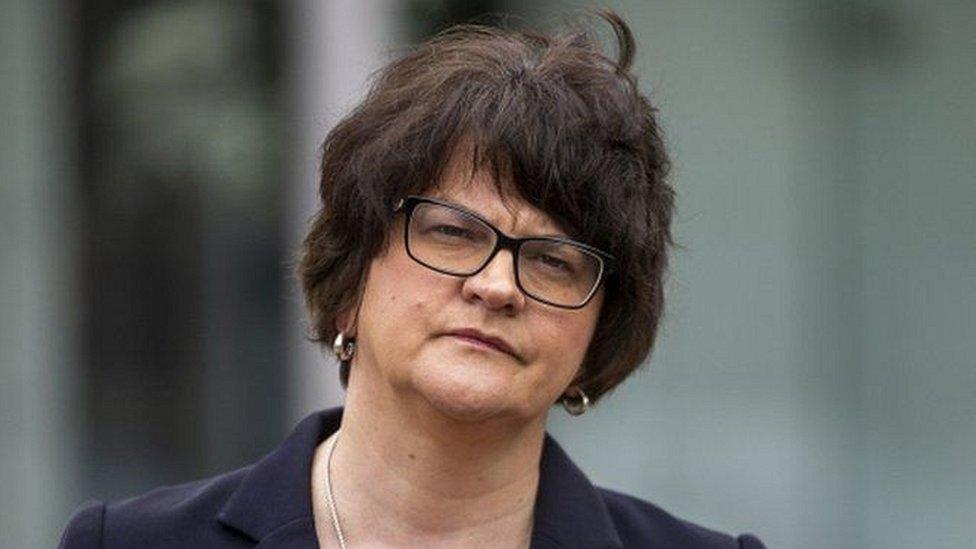Arlene Foster: DUP leadership remains in doubt after revolt
- Published
Arlene Foster plays down talk of a threat to her leadership of the DUP
Arlene Foster's future as leader of the Democratic Unionist Party remains in doubt on Wednesday as she faces a heave from within her own party.
A letter of no confidence in Mrs Foster, who is also first minister, has been circulated among DUP MPs and MLAs.
The party said it would not be commenting.
It is understood there is majority support among the party's Stormont and Westminster ranks - about 80% - for a change in leadership.
It is believed 22 of the party's 27 MLAs (Members of the Legislative Assembly) and four MPs have so far signed the letter.
Only a small number of the DUP membership - MLAs and MPs - will get to vote in a leadership contest.
Mrs Foster has endured a turbulent time as DUP leader and the fall-out from Brexit - which the party supported - has put particular pressure on the party's top brass as it faces having to weather the storm caused by the Northern Ireland Protocol, which imposed a border down the Irish Sea.
It has also been suggested that recent changes to NI's abortion laws and the commitment to implement an Irish language act were causing concerns with some elected DUP representatives ahead of next year's assembly election.
She has not commented on the leadership move since Tuesday, but on Wednesday afternoon she tweeted to say she had visited a primary school in her constituency.
Allow X content?
This article contains content provided by X. We ask for your permission before anything is loaded, as they may be using cookies and other technologies. You may want to read X’s cookie policy, external and privacy policy, external before accepting. To view this content choose ‘accept and continue’.
In addition, a letter was sent from DUP councillors to the party chairman, Lord Morrow, stating they were "severely worried" about the state of the party and country and calling for Mrs Foster and deputy leader Lord Dodds to resign.
"We as councillors and as members are deeply concerned about the future of unionism, Ulster conservatism and the DUP," the letter states.
"As members and councillors, we have received the brunt of the anger from our voter base caused by ineffective leadership."
A separate letter from councillors in Lisburn and Castlereagh Council states the current party leadership "no longer enjoys the confidence of the party membership , the majority of DUP elected representatives and most importantly the unionist people".
The group lists a number of issues which have caused them concern, ranging from the NI Protocol, abortion legislation, same sex marriage, policing and the recent gay conversion debate at Stormont.


Arlene Foster is, in a sense, backed into a corner. We are waiting to hear how she is going to respond to this crisis of leadership in the party.
Our understanding is that Lord Morrow, the DUP chairman, has not yet received the letter of no confidence in Mrs Foster. He has to be handed the piece of paper. It can't be sent electronically.
Lord Morrow is in London at present but is due home on Thursday. He will be handed the letter then and is planning to meet Mrs Foster on Thursday night.
That's not to say that Mrs Foster might not act herself and come out with her own statement on her future.
It may well be the easy part to remove Mrs Foster from her position.
The more challenging role for the DUP is to try to plot a way out of this and try to find a course to bring the party back together again.
It is unchartered waters for the party.
Normally the party has a vacancy filled before a vacancy arises. Now it finds itself sharply looking at the prospect of having a vacancy, but without anyone to fill it.

How did we get here?
Mrs Foster was elected as the first female leader of the DUP in December 2015, taking over from Peter Robinson. She was the only candidate.
Her time at the helm has been seen many challenges, having faced Brexit, a botched green energy scandal which subsequently led to the collapse of Stormont for three years and Covid-19.
The aftermath of Brexit has also caused friction both internally and between the party and some of its core voters who are unhappy at the deal which led to the Irish Sea border.
The DUP has argued that it has never supported the Northern Ireland protocol and has actively tried to have it overthrown.
For some time there have been rumblings of discontent, but Mrs Foster's internal enemies have lacked the numbers, or the courage, to act against her.
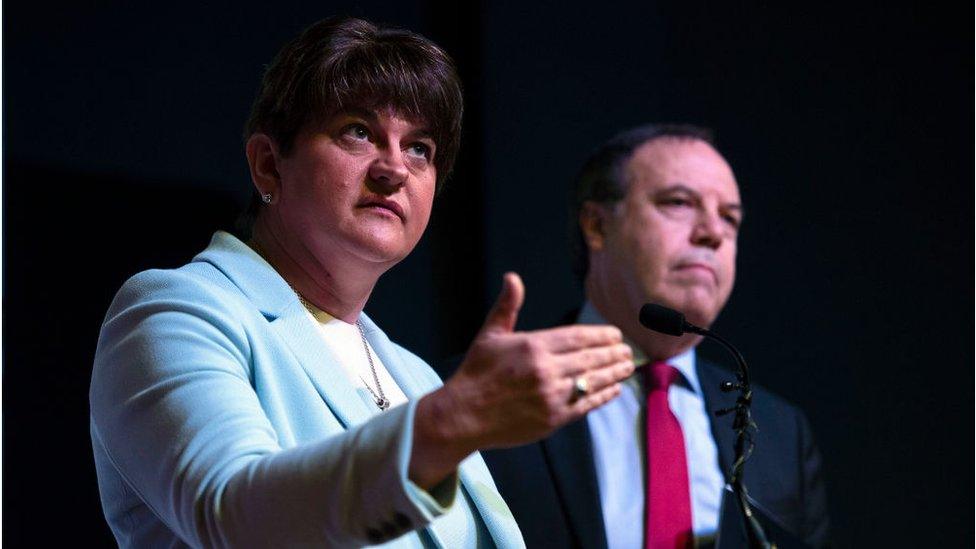
DUP councillors have also called for the resignation of Mrs Foster, along with deputy leader Lord Dodds (right)
Leadership stories
Earlier on Tuesday, Mrs Foster played down suggestions her leadership of the party was under threat.
It followed a report in the Belfast News Letter, external, which said there was internal party unrest over her leadership.
But Mrs Foster said stories on leadership "come up from time to time".
"So we'll just deal with it and move on because I've bigger things to do, including getting us through this Covid pandemic, including listening to the concerns of working-class communities," she said.
Mrs Foster posted a biblical verse from the Book of Psalms on her private Facebook page on Tuesday evening: "It is God who arms me with strength and keeps my way secure".
Who could replace Mrs Foster?
Possible contenders to replace Mrs Foster include NI Agriculture Minister Edwin Poots, Lagan Valley MP Sir Jeffrey Donaldson and East Belfast MP Gavin Robinson.
There has been speculation of a split role, with one person for first minister and then a party leader at Westminster.
Mrs Foster has represented the Fermanagh and South Tyrone constituency since 2003.
In a statement, the DUP said on Tuesday it would not be commenting.
"Whilst understanding that there will be from time-to-time public interest in party processes, these issues, in the first instance, are matters for members of the party and we are not able to make any further comment at this time," it said.
Meanwhile a planned North South Ministerial Council (NSMC) meeting on agriculture did not go ahead on Wednesday after DUP minister Edwin Poots indicated he would not be taking part.
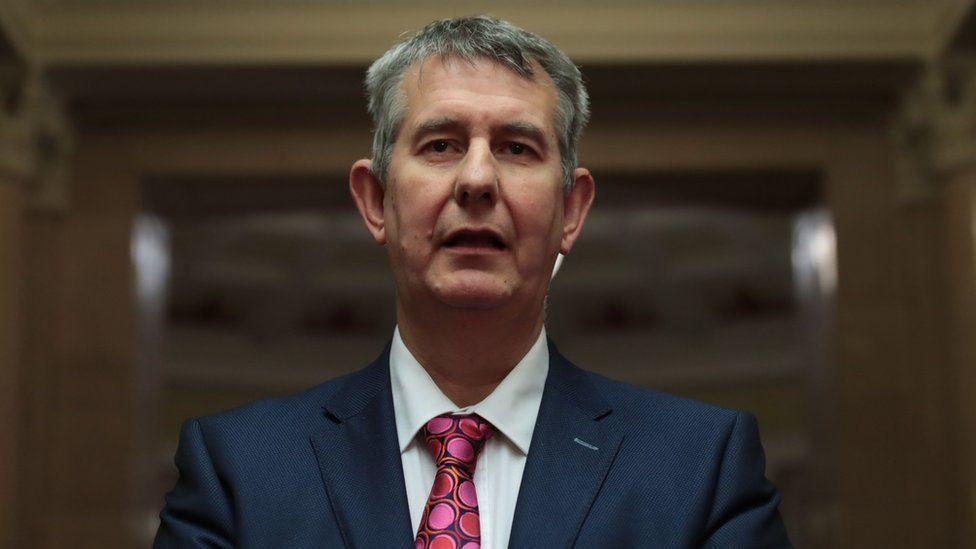
A planned North South Ministerial Council (NSMC) meeting is not going ahead after DUP minister Edwin Poots indicated he would not be taking part
Mr Poots was due to chair the meeting.
The NSMC is the main body for cross-border co-operation between the governments of Northern Ireland and the Republic of Ireland.
The DUP has been criticised for not attending previous NSMC meetings, with claims it is boycotting some NSMC meetings due to their opposition to post-Brexit arrangements for Northern Ireland.
Mrs Foster has said this was not the case, although she has said North-South relationships will be affected by the NI Protocol.
On Wednesday, Deputy First Minister Michelle O'Neill described Mr Poots' decision not to attend the NSMC meeting as "hare-brained antics".
Charlie McConalogue, the Irish agriculture minister, said he was disappointed at the move, while Irish Foreign Minister Simon Coveney said "targeting" north-south relations was counterproductive.
Allow X content?
This article contains content provided by X. We ask for your permission before anything is loaded, as they may be using cookies and other technologies. You may want to read X’s cookie policy, external and privacy policy, external before accepting. To view this content choose ‘accept and continue’.
How would a leadership election work?
DUP rules say a leadership election should be called by 30 April. Normally this is simply a formality and the existing leader continues in their role, but other candidates are free to challenge them.
Only a small number of party members are eligible to vote in such a contest - MPs and NI Assembly members (MLAs). There are 27 MLAs that hold the party whip - including Mrs Foster - and eight MPs.
Party rules currently state the leader of the party must be an MLA, but there has been talk of changing this rule to allow an MP to hold the role.
The role of first minister is separate, but as the largest party from the largest grouping (unionism) in the assembly, the DUP is entitled to nominate someone to hold the post of first minister.
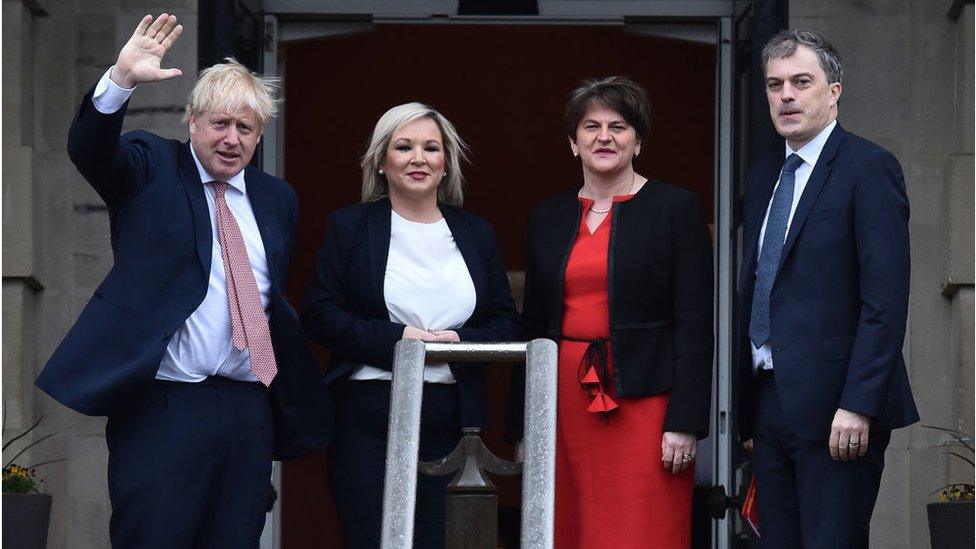
Boris Johnson and then NI Secretary Julian Smith visited Stormont in January 2020 to mark the restoration of devolution
If Mrs Foster stepped down as first minister, the DUP would then be asked to nominate a replacement within seven days and a vote would be held in the assembly.
If a replacement is not nominated, then the Northern Ireland secretary is obliged to call an assembly election.
The New Decade, New Approach deal, external, which was signed in January 2020 and restored the NI Assembly after a three-year hiatus, included a commitment to extend the time to appoint a new first or deputy first minister after a resignation from seven days to six weeks.
However, this has not yet been legislated for.
A UK government spokesperson told the BBC that "good progress" was being made with the legislation and it will be brought forward during the second parliamentary session.


The turmoil in the DUP is being watched in Brussels.
The European Commission would dearly love unionist leaders to reach some sort of pragmatic accommodation with the Northern Ireland Protocol.
In fact, Arlene Foster was edging towards that position until the Article 16 controversy at the end of January, when EU moved to introduce controls on vaccines made in the bloc, including to Northern Ireland, amid a row about delivery shortfalls.
It quickly reversed its decision following condemnation in London, Dublin and Belfast.
Since then, unionist attitudes have hardened. There is no way an aspirant DUP leader is now going to make the case for living with a reformed Protocol.
One of the favourites to replace Mrs Foster has had a role in implementing the Protocol.
Edwin Poots is Northern Ireland agriculture minister and it is his department which operates the Irish Sea border posts.
But Mr Poots has been assiduous in leaving a paper trail which shows that at every stage that implementation has only happened under orders from ministers in London.

- Published27 April 2021
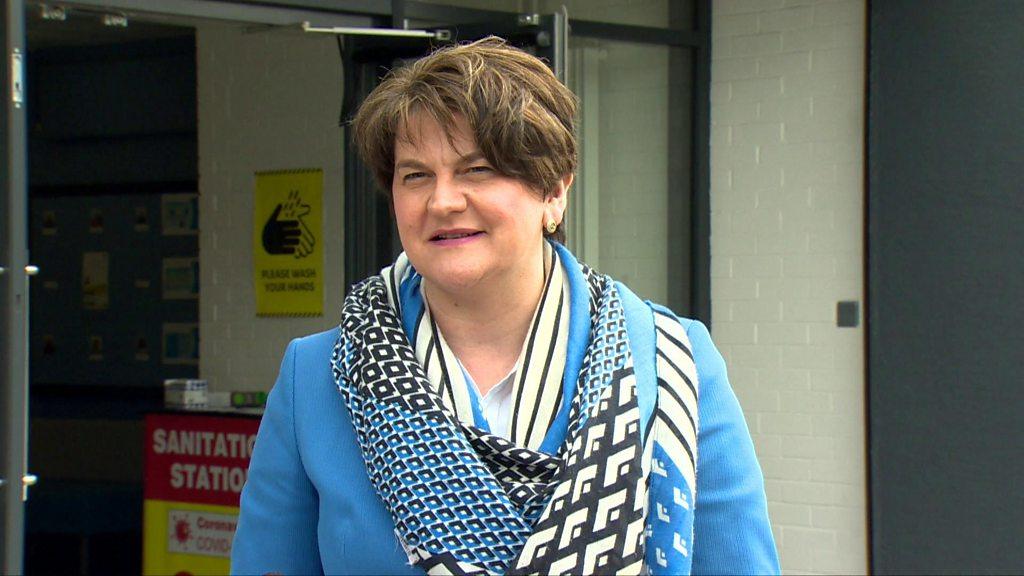
- Published27 April 2021
